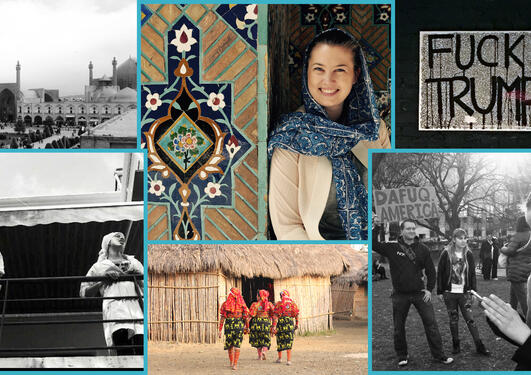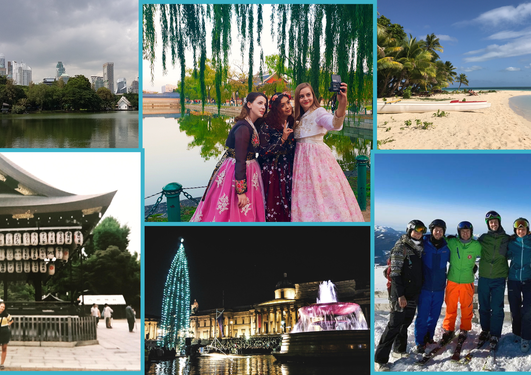Ukraina, sansing, flukt og transhumanisme: Frie studiepoeng høsten 2023
Vil du lære mer om hvordan antropologien tilnærmer seg teknologi som skal gjøre oss udødelige? Eller om hvordan sansene våre – syn, lukt, lyd, smak og berøring – kan oppleves ulikt i ulike kulturer? Ønsker du å forstå hvordan Øst-Europa som region påvirkes av krigen i Ukraina? Eller hva med å få dybdeinnsikt i hvordan mennesker på flukt opplever å bli fordrevet fra hus og hjem?

Hovedinnhold
I bachelorgraden i sosialantropologi inngår 60 studiepoeng hvor du kan fritt kan velge emner. For mange står dette for tur høsten 2023.
Dette gir deg mulighet til å lære mer om et tema som du er ekstra nysgjerrig på, og til å få dypere innsikt i hvilken forskning som pågår på instituttet akkurat nå. Det kan også åpne opp et nytt interessefelt som kan bli viktig for videre studier og jobb, eller kanskje det gir deg ideer til tema for din egen masteroppgave?
Emnene er åpne også for studenter fra andre fag, og vil bli undervist på engelsk.
Antropologiske valgemner
Høsten 2023 kan du fordype deg i følgende antropologiemner:
SANT285-8 Current Anthropological Research: Anthropology of Displacement
From the course description: "Displacement," in popular and academic accounts alike, is widely associated with refugees and the act of fleeing one’s home owing to violence. This course, however, suggests that dis-place-ment conveys much more widely human experiences. These include the meaning of place; home, safety, and belonging; the search for roots and origins; and how experiences of rupture impact people's capacities to thrive.
Anthropological work, with its focus on lived experience, provides a particularly powerful entry point from which to explore nuances of how people do (and do not) belong. The course will introduce students to key theoretical and ethnographic approaches to the study of place and what it means to be dis-placed. Topics explored will include, among others: nations and nationhood; borders governance and border crossing; law and illegality; place and place-making; displacement in place; and what it means to build flourish lives and communities in times of social and economic crisis.
SANT285-9 Current Anthropological Research: Sensory Worlds Across Times and Cultures
From the course description: The capacity for sensing is a fundamental part of being human. Sensory anthropology works from the premise that the human sensorium - sight, sound, smell, taste, touch - is a biological resource that is also culturally shaped and mediated. Not only are the senses combined and prioritized differently in different cultures, but the significance given to each sense is also subject to wide variations. The valuation of the senses, and the ways they are summoned for classification and ideological work, clearly varies across history and place. Our embodied sensorium is always embedded in wider social structures, ready to be employed as perceptual technique, intersubjective marker, and as a classificatory tool to mark social distinctions and power relations. In the more phenomenological domain, the senses are intimately woven into our most basic experiences - of time, memory, space, and particular environments. Intimately bound up with emotion and affect, the senses drive our desires, imaginaries, curiosities, and the construction of our knowledge. Most significantly, the senses build communicative bridges to other species with which we interact and share the world.
To put it simply, approaching the senses from an anthropological perspective allows us to understand their vital role in people's everyday lives, both personal and public, across different social, cultural, and historical settings.
The course is conceived of as a journey through time and place. It is a journey that draws on diverse ethnographic examples from around the world and examines the sensory engagements afforded by rainforests, savannahs, slums, cities, multicultural markets, and the interiors of buildings. It is also a journey that incorporates sensory examples from the world of fiction, art, and the material forms that frame our contemporary lives. The journey will take us back to colonial times to recover aspects of our disciplinary history when anthropologists classified their subjects in foreign lands according to a sensory, evolutionary, hierarchical schema based on race. It will also take us back to medieval Europe where the senses were employed in making gender distinctions and other binary classifications. In both cases, the senses were pressed into service by structures of power which produced marginalization and inequality on a societal and global scale.
Together we will explore and analyze sensory worlds through a multi-media approach - consisting of lectures, texts, sound clips, film, photo, podcasts, and forays into the savory environs of food markets. Aside from those specializing in anthropology, this course will be of interest to students across the social sciences and humanities.
SANT285-10 Current Anthropological Research: New Technologies and the Future of the Human
From the course description: Technological innovation in human-computer interfaces, medical breakthroughs in biotechnology, and an emerging notion that ageing is a disease seriously challenge established understandings of what a human being is, what aging is and what the process of dying is. Augmented realities (AR), virtual realties (VR) and innovations in AI technology (such as the ChatGPT) also fundamentally challenge our understanding of what the human mind is, what consciousness is, and perhaps also what reality is.
In this course we will look at a range of ethnographies on these new technologies of the body and of the mind .We will look at the nature of human (transhumanism, posthumanism), the nature of death and dying (technoscientific immorality, cryonics, mind-upload), the nature of the social (AI companions, avatars etc) and the nature of the real (the "reality crises", deep fakes, simulation hypothesis, etc).
Although the technology we will look at is new, the questions we will grapple with have been around for a long time: how does the specific notion of what the human is (mind/body) reflect specific ideas of what the world is; what the real is? These questions are discussed in theories of religion, mythology, psychology and more. In this course we will employ new anthropological ethnographies to open new questions and new perspectives on key questions in anthropological theory.
SANT280-16 The Frontier of Anthropological Research: In Times of War: Cultural and Symbolic Landscapes in Contemporary Eastern Europe
From the course description: The devastating impact of Russia’s full-scale invasion of Ukraine is felt not only in the immediate war-affected areas, but also in the regions adjacent to it, namely in Eastern Europe and the Caucasus. People living in these regions bordering either or both Ukraine and Russia have become acutely aware of the war at their doorsteps as it triggers transformations and ruptures of cultural, social, economic, and political systems, and affect their everyday lives in tangible ways. The war has also sparked new conversations about these regions and their citizens’ cultural, political, and economic connections to Russia as well as ignited new discussions re-evaluating their cultural linkages with Russia and historical legacies of their Soviet past.
In times of war, cultural and historical sites become saturated with new political meanings and thus become symbolic battlefields for political messages. As Soviet era monuments are brought down across Eastern Europe, new language policies introduced, and cultural practices associated with Russia innovatively changed, Eastern Europe’s cultural and symbolic landscape is being reconfigured and transformed. This course, In Times of War: Cultural and Symbolic Landscapes in Contemporary Eastern Europe, addresses these current processes.
With the war in Ukraine as key context, this course will introduce students to the wider region of Eastern Europe and gain insights into ongoing processes transforming the cultural and symbolic landscape in countries of Eastern Europe and the Caucasus. Drawing primarily on ethnographic studies, students will explore discussions and practices related to the politics of memory, de-sovietisation and de-colonization, as well as language policies, and questions of identity and belonging.
Prøv noe nytt!
Du kan benytte de frie studiepoengene til å prøve ut en annen faglig interesse. Ved SV- og HF-fakultetet er de fleste emner åpne for alle.
Finn emner ved å filtrere på fakultet i denne oversikten:
Andre spennende tips:
- Høyrt om dannelsesemne ved UiB?
- Har du 120 sp og vil prøve et praktisk emne? Les mer om PRAKTINF Praktisk informasjonsarbeid og søk om plass
- Innføring i samfunnsvitenskapelig metode, med vekt på kvantitativ metode er nyttig også for antropologer, les mer om MET102
- Interessert i kjønnsstudium? Sjekk ut tilbudet ved Senter for kvinne- og kjønnsforskning og ellers ved UiB
- Interessert i pedagogikk eller psykologi? Det psykologiske fakultet har en liste med åpne emne for alle UiB-studentar
- Interessert i språk? Ta en kikk på Institutt for fremmedspråk sine hjemmesider
Vil du bli lærer?
Om du vil bli lærer er det lurt å ta et årsstudium i et annet undervisningsfag enn samfunnsfag. Dette gir grunnlag før du søker deg til Praktisk-pedagogisk utdanning (PPU) etter endt mastergrad.
Hvordan melde seg opp til emner?
- Finn ut hvilke emner ved UiB du vil ta. Dobbeltsjekk at de aktuelle emnene er åpne for alle UiB-studenter og ikke har forkunnskapskrav. Til sammen utgjør 30 sp full arbeidsmengde per semester. Se etter emner på 100- eller 200-nivå (emnekoder som begynner på 300 er for masterstudenter, mens 600 er for etter- og videreutdanning).
- Dobbeltsjekk at undervisning og eksamensdato ikke kolliderer (særlig viktig om du velger emner på ulike institutt/fakultet). Time- og eksamensplanen for vårsemesteret publiseres 1. juni 2023.
- Meld deg opp i emnene og semesterregistrer deg i Studentweb. NB: Disse emnene ligger ikke i studieplanen, så du må søke dem opp i Studentweb med emnekode. Frist: 1. september 2023.
Studieveiledning
Lurer du på noe som har med frie studiepoeng, studieløpet generelt, utveksling eller masterprogrammet å gjøre? Kom på studieveiledning! Fast veiledningstid er mandager etter lunsj, mellom 12:30-15:00. Vanligvis sitter studieveileder på veiledningskontoret ved Infosenteret, men veiledningen kan også være digital. Book tid i veiledningskalenderen.
HUSK: Infosenteret kan hjelpe deg med det meste av teknisk og praktisk art som du trenger i studiehverdagen, mens undervisingsassistentene og emneansvarlig svarer på faglige spørsmål. Alt utenom dette kan du snakke med studieveileder om.



